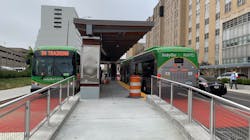IndyGo finalizing test runs prior to start of Red Line service
One week before service is set to start on Indianapolis Public Transportation Corporation’s (IndyGo) Red Line Bus Rapid Transit (BRT) line, operators began their final practice runs along the entire route.
The 13.1-mile route runs between the north side’s Broad Ripple and the University of Indianapolis to the south with 28 stations and vehicle headways of 10 minutes during weekdays and 15 minutes during weekends.
IndyGo said that new road configurations and pavement markings have been in place since July 31 on College Avenue, Meridian Street and Capitol Avenue. Capitol Avenue now includes an IndyGo northbound bus-only lane has been added to the road in which drivers are yet not accustomed to.
“As the Red Line is a service that is brand new to our riders and our bus operators, we expect there may be delays and occasional challenges for the first few weeks. Please be patient as everyone works to get comfortable with the system and ensure that everything is working together properly,” IndyGo said.
The transit provider also encouraged drivers to watch its rules of the road videos that highlight the new road configurations and are available at www.indygo.net/red-line/.
BYD is supplying the electric buses for the Red Line. The electric buses are part of IndyGo’s plans to replace all its diesel buses with electric models by 2032; reducing pollution and operating costs, while improving service for Indianapolis residents and visitors.
IndyGo will offer free rides on the Red Line during the entire month of September and will post volunteers at Red Line stations to help answer rider questions once service begins on Sept. 1.
About the Author

Mischa Wanek-Libman
Group Editorial Director
Mischa Wanek-Libman is director of communications with Transdev North America. She has more than 20 years of experience working in the transportation industry covering construction projects, engineering challenges, transit and rail operations and best practices.
Wanek-Libman has held top editorial positions at freight rail and public transportation business-to-business publications including as editor-in-chief and editorial director of Mass Transit from 2018-2024. She has been recognized for editorial excellence through her individual work, as well as for collaborative content.
She is an active member of the American Public Transportation Association's Marketing and Communications Committee and served 14 years as a Board Observer on the National Railroad Construction and Maintenance Association (NRC) Board of Directors.
She is a graduate of Drake University in Des Moines, Iowa, where she earned a Bachelor of Arts degree in Journalism and Mass Communication.
